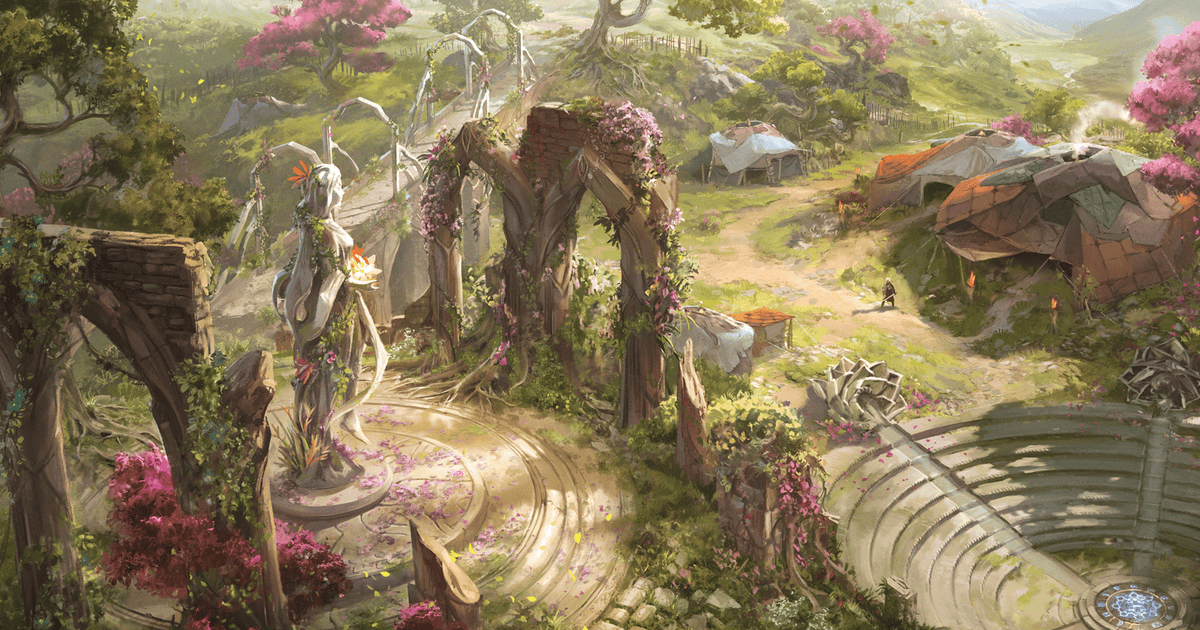I’m never quite sure whether I’m doing the right thing in Last Epoch, yet as I float around as an undead vacuum cleaner – hoovering up my enemies’ health bars while my minions keep them distracted – I know that I’m at least having a good time.
I’ve opted for a lich build, and thanks to the flexibility of Last Epoch’s skill trees, I’ve been able to dip into other subclasses to create my own personal playstyle. Is it a viable build for the hardest endgame battles? Almost certainly not, but I’m glad I haven’t succumbed to the urge to Google the current meta.
That’s because tinkering and experimenting with different builds is the point of Last Epoch, and trying to find short-cuts to this would mean skipping the very best part of the game. Which, for me, is the experimentation found in the levelling and build-creation process. As I discovered towards the later stages of the campaign and the start of the endgame, however, this is a strength that gradually loses its potency. When the rate of progression slows down and there is no longer an obvious supply of new abilities or rewards to keep you entertained, Last Epoch starts to feel like it’s running out of fresh ideas.
Like any classic ARPG, things kick off in Last Epoch with a story campaign where you pick your class and develop your abilities. Set in the mystical land of Eterra, your character stumbles into the middle of a war between gods, and somehow gets sucked into a time rift. Here, you see a version of the future where the world is in ruins – and naturally, it’s up to you to hop between timelines to fix the problem. It’s a clever concept that allows you to see the world as it goes through various ages, pitting you against a variety of different tyrants and enemies in each. One particularly nifty sidequest involves travelling forwards in time to retrieve a badge from some ruins, then travelling back in time with the badge to pass through a checkpoint. Showing players the messy end result of Eterra’s timeline also sets up a nice investigative mystery: how did things end up this way, and what sort of route will you take through time to fix it?
Perhaps inevitably – given all the time hopping – the plot does end up feeling quite convoluted. Don’t ask me to explain what happened, because frankly, it’s already turned into mush in my brain. Last Epoch’s story is so focused on grand concepts like gods and time-travel that it skimps on the more human side of things, and lacks memorable characters. This is partly because you breeze through areas so quickly that it’s impossible to form a bond with anyone before moving on. But the written dialogue also isn’t particularly inspiring, with the tone frequently swinging between serious and wise-cracking. There’s also something rather comical about the way every NPC explains to you why they can’t do a task themselves, and must remain at their post. I was half expecting someone to say they’d ‘left the oven on’ and had to dash home. Equally, most side-quests are straightforward things that typically involve checking to see if a person is alive (usually they’ll be found dead somewhere on the trail). Without a real sense of these communities and cultures, it’s hard to feel connected to the world of Eterra and its people.
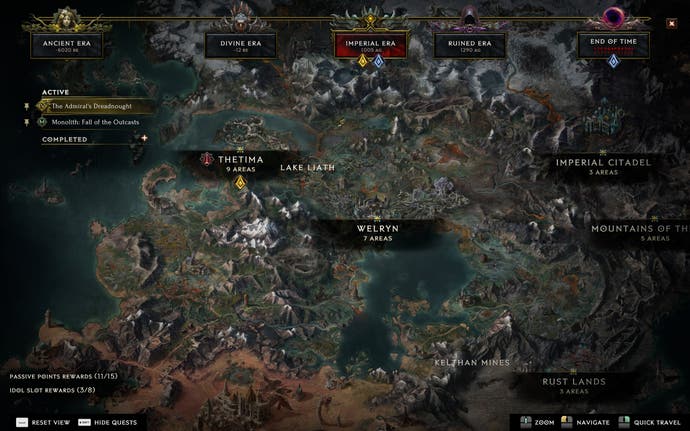
For many ARPG enthusiasts, however, the story is never the most important aspect of these games: combat and build-creation is the key focus. And in these areas, Last Epoch really excels. There are five starter classes in Last Epoch, each of which can specialise in one of three masteries, equalling a total of fifteen subclasses within the game. So as you can probably already tell, there’s a lot of build variety right out the gate. I opted for the acolyte class, purely because I enjoyed the look of the character’s gloomy design. Moody goth skeleton girl? It’s just like reliving my teenage years.
I initially struggled to gel with Last Epoch’s combat design, finding the five active skills in the hotbar to be somewhat limited. But then I was able to choose a mastery, and suddenly, everything clicked. After specialising as a lich, a huge wealth of options opened up, and I found myself continually adjusting my build to improve it. As new skills became available, I would reevaluate and balance my build to support my new playstyle. At one point, I tried creating a build centred around being powerful at low health (requiring some strong emergency wards to put the brakes on). Then I started experimenting with my reaper form, allowing me to transform into an undead ghost, and essentially giving me a second health bar. I had inadvertently turned myself into an annoying two-stage Souls boss: revenge at last. To support this, my focus switched to amping up my mana regeneration, and making my drain life spell as effective as possible. Aside from your starting class and mastery, you can respec all your abilities in Last Epoch, which is what makes all this experimentation possible. This flexibility is much-needed: I once accidentally nerfed myself by picking the wrong option in the skill tree, but was able to undo this once I realised my mistake. No biggie!
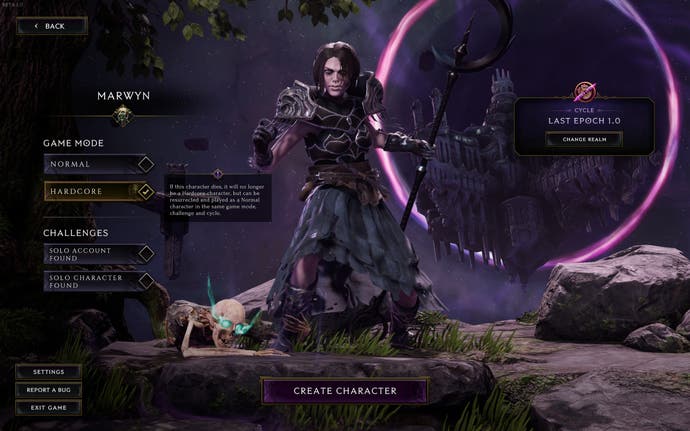
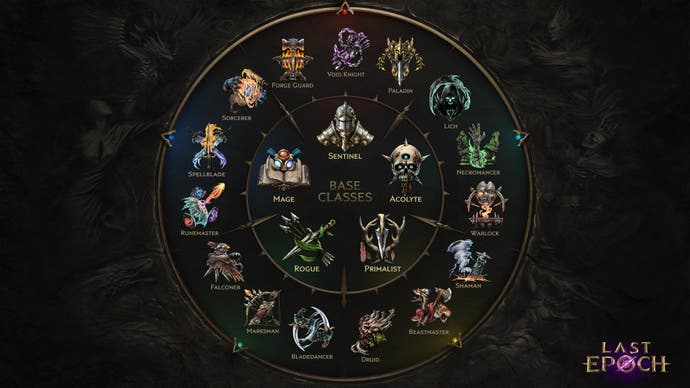
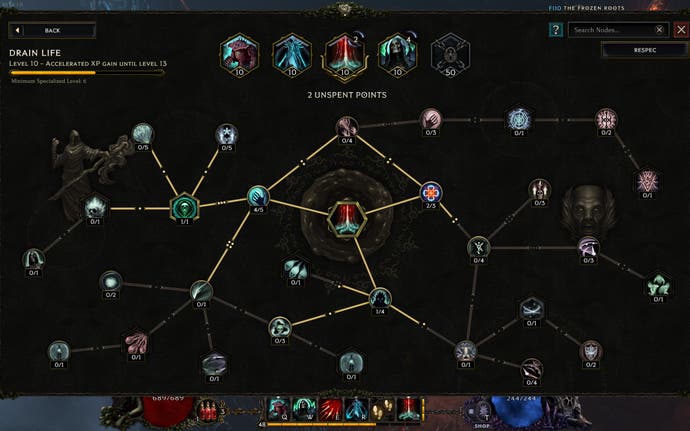
In-between making changes to your build, you’ll find some very crunchy combat sections. Last Epoch is a little like a science lab – you test a build in combat, figure out its needs, make changes, then re-enter combat for another round of testing. At its best, Last Epoch’s combat allows you to sweep through waves of enemies while feeling like an overpowered god. The hits you deliver feel meaty, and are backed up by snazzy visual effects that add flair without detracting from the readability of battles. The upside to quickly speeding through environments in the campaign is that it generates a sense of momentum, and creates the feeling that you’re on a rampage through time and space.
Adding to all this complexity is the loot and crafting system, which allows you to create some highly individualised items for your build. Each item in the world comes with a number of affixes, and at the game’s forge, you can remove these and add new affixes that better suit your playstyle. Rarer items allow you to add a higher number of affixes, and some items have higher ‘forging potential’, allowing you to make a greater number of changes. For me, I found the system to be something of a double-edged sword: on the one hand, it allows players to create unique items that are more individually suited to their needs. On the other, there is just an extraordinary amount of loot in Last Epoch’s world, and sifting through all of this – even with the help of the game’s loot filters – can be a daunting task for new players. It can be difficult to know what to prioritise, or what’s actually good for your build. For much of the campaign, I wasn’t sure whether my new items were actually an upgrade at all. As most of the loot I found was useless to me – or worse than the items I had already crafted – it felt like I wasn’t being rewarded for my efforts. And so, I started ignoring most of the items I found in the world.
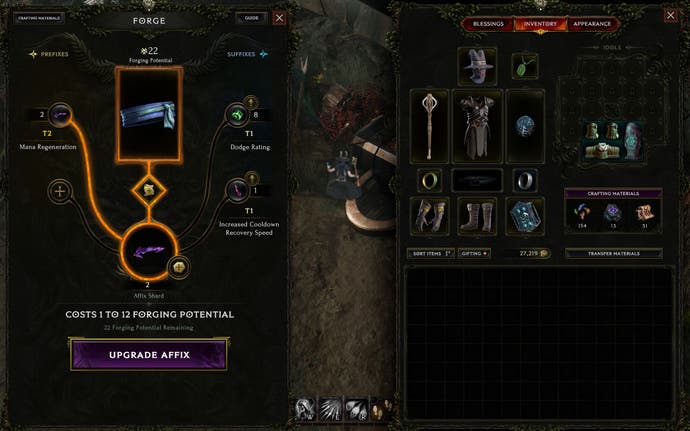
This meant that when I started to head into the later chapters of Last Epoch’s campaign and the early endgame, I was a little reluctant to engage with the grind, as I lacked a clear incentive or goal to aim towards. At this stage, the rate of progression between levels and skill points slows down, meaning you are no longer experimenting with your build to the same degree as earlier in the campaign. The changes become smaller, and harder to notice. Towards the end of the story, there are also a couple of massive difficulty spikes in the form of hard-hitting and aggressive bosses, which feel at odds with the rest of the storyline where things are pretty easy-going. For my minion-managing lich – designed to sit back and deal damage from afar – this was a bit of a shock. The gameplay shifted dramatically from dealing with large groups, to suddenly needing to resist massive damage from one source. Watching my character go from ‘all-powerful god’ to suddenly being smacked by a big snake was disheartening to say the least, and the campaign would have benefitted from a more gradual ramp-up in difficulty.
The endgame missions I experienced also felt a little flat, with neither the game’s dungeons nor monolith system (a series of combat encounters) introducing any big surprises. The dungeons have some unique mechanics – like a fiery floor that will toast your toes if you’re not careful – but the monolith system is made up of a lot of quick dives into pretty straightforward chambers (echos), where you kill a number of enemies and then leave. The punishment for failing an echo or dungeon can feel quite harsh, with the player only given one life per attempt, and forfeiting either the echo rewards or the dungeon key should they die. Accidentally teleported into a fireball? No cookies for you! This leaves no room for mistakes – which are easily made, given the chaos of fights and the strength with which bosses hit. To my mind, this discourages you from learning enemy behaviours and improving your tactics through repetition.
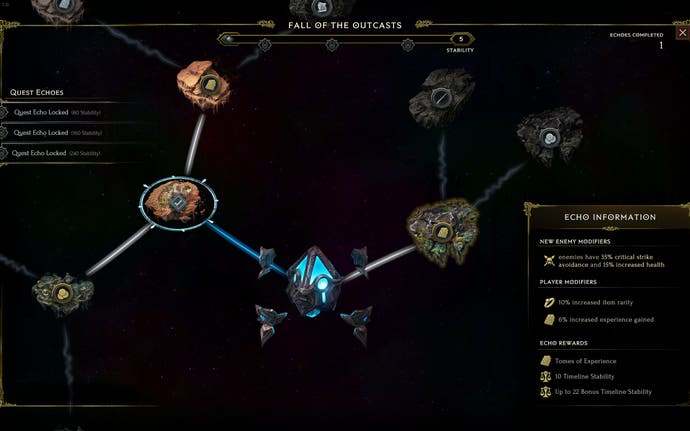
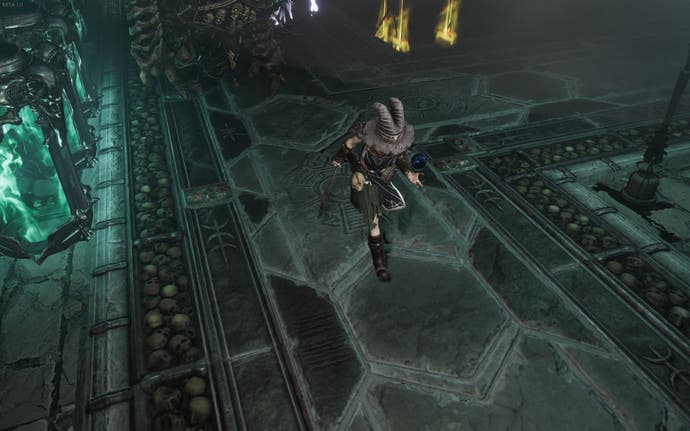
At this point it’s worth noting that although Last Epoch is a premium game (its Steam Early Access version costs £29.50 at time of writing), it does contain a microtransactions store. The items sold here are cosmetic-only, and developer Eleventh Hour Games has explained that the store exists to fund further development of the game post-launch. The developer told me that certain cosmetics can be earned in-game, and through events and Twitch drops. Players will also be given some store currency when they first buy the game. With the store not active in the build I was given, it was difficult for me to examine how the cosmetic system would function. I do hope, however, that some cosmetic items are made available to earn through gameplay even at lower levels. During my playthrough I didn’t earn a single cosmetic item, which was a shame, as this meant my character ended up wearing whatever grubby rags I picked up off the floor that would work with her build. It wasn’t really screaming I’m a super powerful skelly mage. Perhaps we’ll call it ‘urchin chic’.
My enthusiasm for Last Epoch waned by the end of my playthrough, but it’s still a dependable ARPG that provides significant depth and the ability to customise a build down to the finest of details. It shines brightest during its early to mid-stage levelling process, where new ideas and options pop up every few minutes, and you’re encouraged to continually experiment with your approach. There’s something very engrossing about evolving your build, patching up weaknesses, and changing your playstyle when you discover a new ability you love. Perhaps the best way to play Last Epoch is by creating several different characters, then taking your very favourite builds through to the endgame. With Eleventh Hour Games indicating it wants to bring further additions to Last Epoch in the years to come, it’s possible new additions could eventually spice up the later stages. And in the meantime, there’s a lot to be said for just messing around with builds to your heart’s content.
A copy of Last Epoch was provided for review by Eleventh Hour Games.

Sophie Anderson, a UK-based writer, is your guide to the latest trends, viral sensations, and internet phenomena. With a finger on the pulse of digital culture, she explores what’s trending across social media and pop culture, keeping readers in the know about the latest online sensations.

